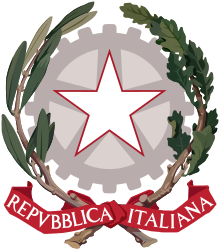|
Military Judiciary Council of Italy
The Council of the Military Judiciary (Italian: Consiglio della magistratura militare), also known as CMM is the self governing body of the Italian military judiciary. The seat of the council is located in Palazzo Cesi, Rome.[1] HistoryIt was provided for by law no. 561, establishing the Council of the military judiciary, and the relative implementing regulation, the DPR March 24, 1989 n. 158, containing the Implementation Rules of the Law of 30 December 1988, n. 561,[2] which established the Military Judicial Council, in order to standardize the military judges to ordinary judges, giving the Council of the Military Judiciary the same powers provided for the High Council of the Judiciary (Italy).[3] FunctionsThe council for military magistrates has the same powers as the High Council of the Judiciary. In particular, it provides for recruitment, assignments, transfers, promotions, disciplinary proceedings and any other aspect inherent to the legal status of military magistrates, as well as the conferral of extrajudicial appointments and any other matter attributed to it by law.[citation needed] In relation to disciplinary proceedings, the Minister of Justice and the Attorney General at the Court of Cassation are replaced, respectively, by the Minister of Defense and the Military Attorney General at the Court of Cassation. The disciplinary procedure against military magistrates is governed by the rules in force for ordinary magistrates. The military attorney general at the Court of Cassation exercises the functions of public prosecutor and does not participate in the deliberations.[citation needed] CompositionThe Council of the Military Judiciary previously comprised:
Following the law of 24 December 2007 n. 244, art. 2, paragraph 604, and starting from the first elections for the renewal of the Military Judiciary Council and as a result of the law of 3 August 2009, n. 102 the members of the Board are restated as follows:
The legal status of the componentsAs regards the legal status of non-magistrate members of the council, the provisions relating to the CSM, as applicable, are observed, namely the law of 24 March 1958, n. 195, et seq. The economic treatment of these members is established with the Prime Minister's Decree, on the proposal of the Minister of Defense, in agreement with the Minister of Economy and Finance, having regard to incompatibilities, workloads and allowances of the members of the Council superior of the judiciary elected by parliament.[citation needed] Current members
References
|
||||||||||||
Portal di Ensiklopedia Dunia
